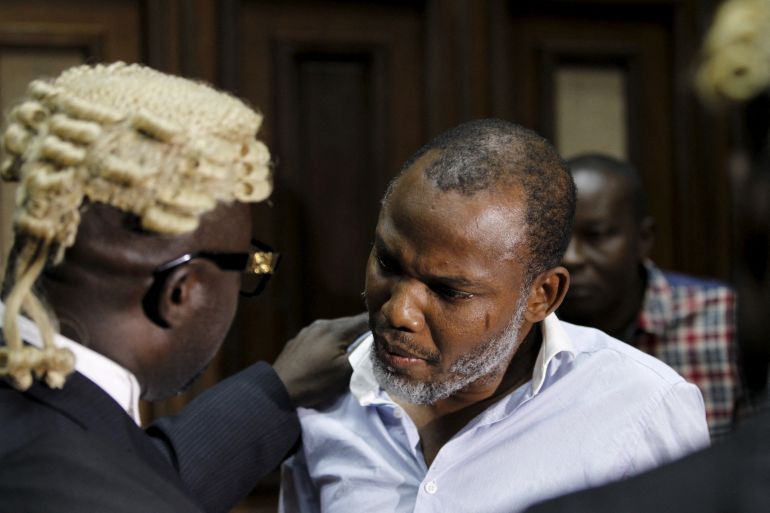Nigerian separatist Kanu faces new charges as trial resumes
Kanu previously pleaded not guilty to seven charges including terrorism and calling for secession.

Prosecutors have filed additional charges against Nigerian separatist leader Nnamdi Kanu as his trial on terrorism charges has resumed.
Kanu heads Indigenous People of Biafra (IPOB), a group he founded circa 2012 that is pressing for the secession of the Igbo ethnic group’s homeland, which covers part of southeast Nigeria. The Nigerian authorities view IPOB as a terrorist group.
Keep reading
list of 3 itemsNigeria: Separatist leader to appear in court for treason trial
Small businesses bear the brunt of Nigerian separatist lockdowns
Kanu previously pleaded not guilty to seven charges including terrorism, calling for secession and knowingly broadcasting falsehoods about President Muhammadu Buhari.
On Tuesday Kanu faced eight additional charges, most linked to broadcasts he made between 2018 and 2021 on IPOB-run Radio Biafra that prosecutors said amounted to terrorism and incitement.
Nigerian authorities last year accused IPOB of attacks on police stations and government offices in the southeast. The group denies this and has called the accusations an attempt to force it to disband.
An attempt by the Igbo homeland to secede as the Republic of Biafra in 1967 – the year that Kanu was born – triggered a three-year civil war that killed more than 1 million people.
Lawyer Mike Ozekhome accused the state of ambushing Kanu and prosecutors of filing the additional charges “just to frustrate the trial” and keep Kanu in detention, according to a recording of proceedings made available to reporters.
Ozekhome said Kanu had not seen the new charges until Tuesday and needed time to prepare how to plead.
Media have been prevented from covering the trial, which the judge adjourned until Wednesday.
Al Jazeera’s Fidelis Mbah, reporting from Abuja, said that people in the southeast have divided opinions over Kanu’s group.
“[Kanu’s] supporters feel that the perceived injustices against the region … [have] not been corrected, and they feel the government has marginalised people in the region,” Mbah added.
Kanu was first arrested in 2015 but disappeared while on bail in April 2017. His social media posts during his absence and his Radio Biafra broadcasts outraged the government, which said they encouraged attacks on security forces.
Security agents produced him in court in Abuja on June 29 after detaining him in an undisclosed country. His lawyer alleged he was detained and mistreated in Kenya, though Kenya has denied involvement.
Kanu has filed charges alleging that he was illegally taken from Kenya and asking that he be repatriated to the United Kingdom.